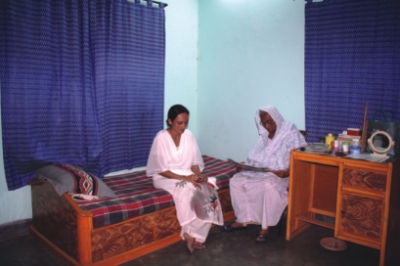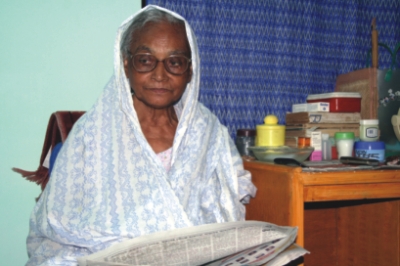|
Endeavour
At the end of the day
Hana Shams Ahmed
After a long, illustrious life what more can a person ask for but some peace and quiet? Perhaps a little time spent with the grandkids and going through a few favourite books. But what happens when after working so hard throughout a person's life he/she does not get the time, or even the respect of his/her children? The film Baghban depicts, perhaps a little too vividly, how a retired couple is treated cruelly by their own children when nearing the end of their lives they want to spend a little time with each of their children.
Although the predicament of an old couple may have been exaggerated in the film, the reality for some is not too far from what the film highlights. Old parents are treated cruelly by their children; and in many cases they are thought of as mere burdens who thwart their pursuit of happiness in their ever-so-busy lives. Thinking about the state of such helpless people, who despite having established children, were leading lonely lives, Taslima Ferdous, a self-motivated social worker, set up a safe home for elderly people to live independently from their families but with people of their own likes. The safe home named Bela Sheshe (literally, at the end of the day) was set up in May 2005 in a small rented house in the capital's Mirpur area with seven beds.
Although in the West it is now a common thing for people to live separately in elderly homes once they are no longer capable of going around on their own, it is still an alien concept in Bangladesh. "People would rather make their old parents suffer in their loneliness instead of putting them in a safe home where they could spend time with other old people and be happy," says Taslima, "It apparently shames them in their society if they put their parents in old homes. But it does not shame them when the same parents after spending years in isolation and neglect from family are pushed to the point of insanity."
Taslima's journey to this point has been long and challenging. She got married very young to a conservative family where she could not continue her education. But that never managed to set her back. "I always wanted to do something for the society. I did not want to take a backseat in life," she says. When she was living in the Shardah Police headquarters in Rajshahi with her husband she found a few empty rooms that were apparently of no use to the police academy. "I felt a kind of desire when I saw them and my mind was racing wildly trying to think of the possible ways I could make use of those rooms. My husband was not too comfortable about asking the DIG about those rooms, so one day I just went forward and asked him myself whether I could use those rooms to run a school. He agreed immediately," recalls Taslima. The school is still running at the Shardah police headquarters.

Chatting with Taslima in one of the rooms of Bela Sheshe.
Later she went to Bogra where she learned some computer skills and opened her own computer training centre for women. "I know almost all the stitching and embroidery in the book. I talked to the wives of rickshaw-pullers living in the nearby slums. I urged them not to waste their free time and spend it to make some money of their own. I sat with them in a mat in front of their homes and taught them some embroidery work", she says. She then put the embroidered clothes on display at the computer-training centre. She had to eventually come to Dhaka for her children's education. After coming here she soon started to feel frustrated. She wanted to do something for the people but did not have the finance to do so. "My grandmother was bedridden for 12 years," she says, "and during that time many people made cruel comments about her. Someone once even had the nerve to say, why don't you just get rid of this burden? I have never forgotten that, and I always wanted to do something for these helpless people ever since that."
"Over the years I have seen old people being ignored, neglected and treated very unkindly by their children and even by the house maids," says Taslima, "No one seems to realise that the elderly people might have some social needs. An elderly person I know, used to be locked up by her family whenever they had any guests at home because they were ashamed of having her in their home. She eventually went insane."
In the beginning it was very difficult for Taslima to find a rented house. "No one wanted to give their house to set up a safe home. After a very long time I found this house in Mirpur, section 11."
Bela Sheshe currently has four resident women. Although it's a very modest start, Taslima has bigger plans for the future. "I don't have much money of my own or any assets to speak of, but my grandmother left me a large amount of land in Naogaon city which I am going to donate to Bela Sheshe," she says. Some doctors in the Mirpur area have extended their support for Bela Sheshe. They regularly give free medical advice for the residents.
"Bela Sheshe is for those elderly who are economically stable but socially unstable. I don't like to think of Bela Sheshe as an organisation. Everyone here is like a family member", says Taslima. A resident has to pay around Tk 4000 per month.

Nurunnessa, now lives independently in the safe home
72-year-old Nurunnesa has been residing in Bela Sheshe for three months now and she says that she has not felt so happy and carefree for quite a long time. Nurunnesa, a retired teacher, has three sons and a daughter, all doing quite well with their lives, but do not have ample enough time to spend with their mother. "I used to live with my daughter but my pride was hurt when my son-in-law didn't approve of some things that I did. So when I learned about Bela Sheshe I decided this was the only place where I could live an independent life and yet get looked after", she says. She exclaims that Taslima is like a daughter to her. "My son from Canada called me up the other day and said, 'I want to meet the woman who has made my mother so happy'", she added. An exception to the rule of the elderly home is Ruchi (not her real name). She is only 38 years old but because of various family and social problems she wanted to stay at a place where she would be cared for and understood. "There is no such place in the country," says Ruchi, "and Taslima aunty was very kind and took me in her care. She has given me the feel of a family that I have never felt after my mother died."
Very few people in our society think about the elderly. We think about the rights of every kind of people in society except the right of the elderly to have a life. An elderly home provides people of similar ages to live in communion and spend their retired life in fun. Hopefully, society will come out of the stigma and understand the importance of such safe homes.
Copyright
(R) thedailystar.net 2006 |
